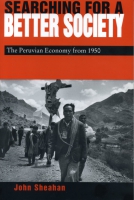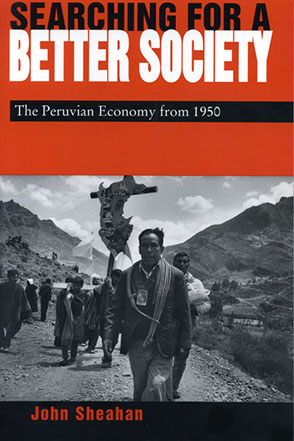Searching for a Better Society
The Peruvian Economy from 1950
John Sheahan
“This lucid study is a rare find: an analysis of a developing economy that successfully integrates the full range of development issues, including economic growth, competitiveness, poverty, social equity, agriculture, industry, and external and domestic finance, and places them all within their historical and political context. Moreover, this study accomplishes this feat for an intricate economy that defies easy understanding. I particularly recommend this book for undergraduate and graduate students in development economics: they will find it an inspiring performance.”
- Description
- Reviews
- Subjects
The Peruvian economy had been growing well with low inflation and no problem of external financing. Sheahan argues that pressures for change came more from rising antagonism to the long-established domination of the society by a privileged minority, extreme rural poverty combined with high concentration of land ownership, unequal access to education and economic opportunity, structures of production and trade adverse to any adequate growth of opportunities for productive employment, domination of the main export sector—mining—and of the oil industry by foreign firms, and general conviction of being left behind by the modern world. The majority of Peruvians were seeking objectives more fundamental than economic growth. They were, with conflicting visions but with many good reasons, "searching for a better society."
Sheahan examines the factors involved in these issues and the consequences of the new economic orientation intended to resolve them. While positive accomplishments have been important, enough went wrong to lead Peru back to a more market-determined economic system in 1990. Sheahan addresses the consequences of this return to the earlier economic strategy and what might be done to shape the process of development—in Peru and in Latin America more generally—toward less unfair societies.
Searching for a Better Society is different from the great majority of economic studies of developing countries in its emphasis on the basic role of social dissatisfaction with the country's traditional liberal economic system and on the complexity of social goals involved in evaluation of the choice and consequences of economic policies.
“This lucid study is a rare find: an analysis of a developing economy that successfully integrates the full range of development issues, including economic growth, competitiveness, poverty, social equity, agriculture, industry, and external and domestic finance, and places them all within their historical and political context. Moreover, this study accomplishes this feat for an intricate economy that defies easy understanding. I particularly recommend this book for undergraduate and graduate students in development economics: they will find it an inspiring performance.”
“This thought-provoking book will be of great interest to policymakers and readers in general searching for new answers to the difficult dilemmas that have haunted the recent history of Peru and other Latin American countries.”
“Sheahan is an economist with a distinguished record of scholarship on Latin America, and like his previous work, this volume is clearly written, cogently documented, and expresses humane sensibilities and an independent viewpoint.”
“Sheahan's study is unusual for its knowledgeable and insightful discussion of political economy issues and the relevant history. It is accessible both to specialists and generalists, to economists and non-economists, and will be very rewarding to all of the above.”
Mailing List
Subscribe to our mailing list and be notified about new titles, journals and catalogs.




